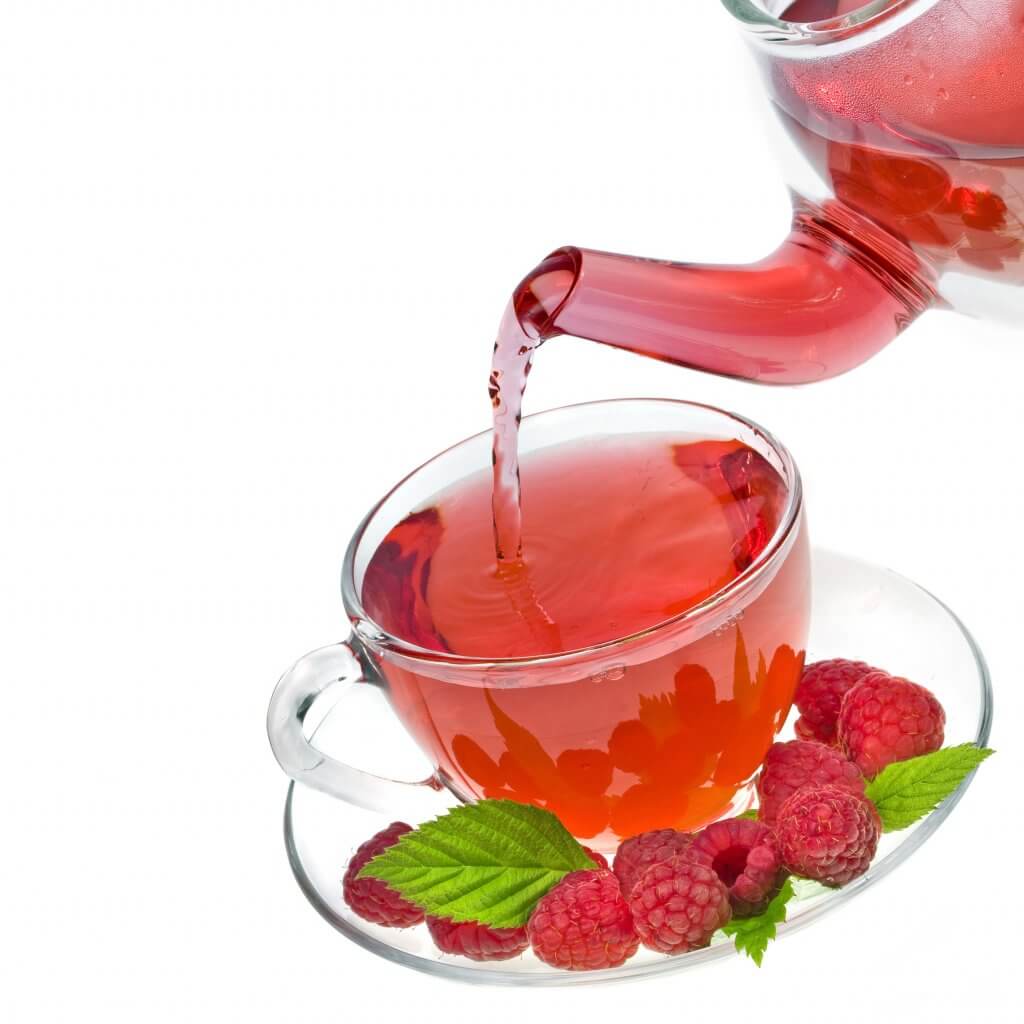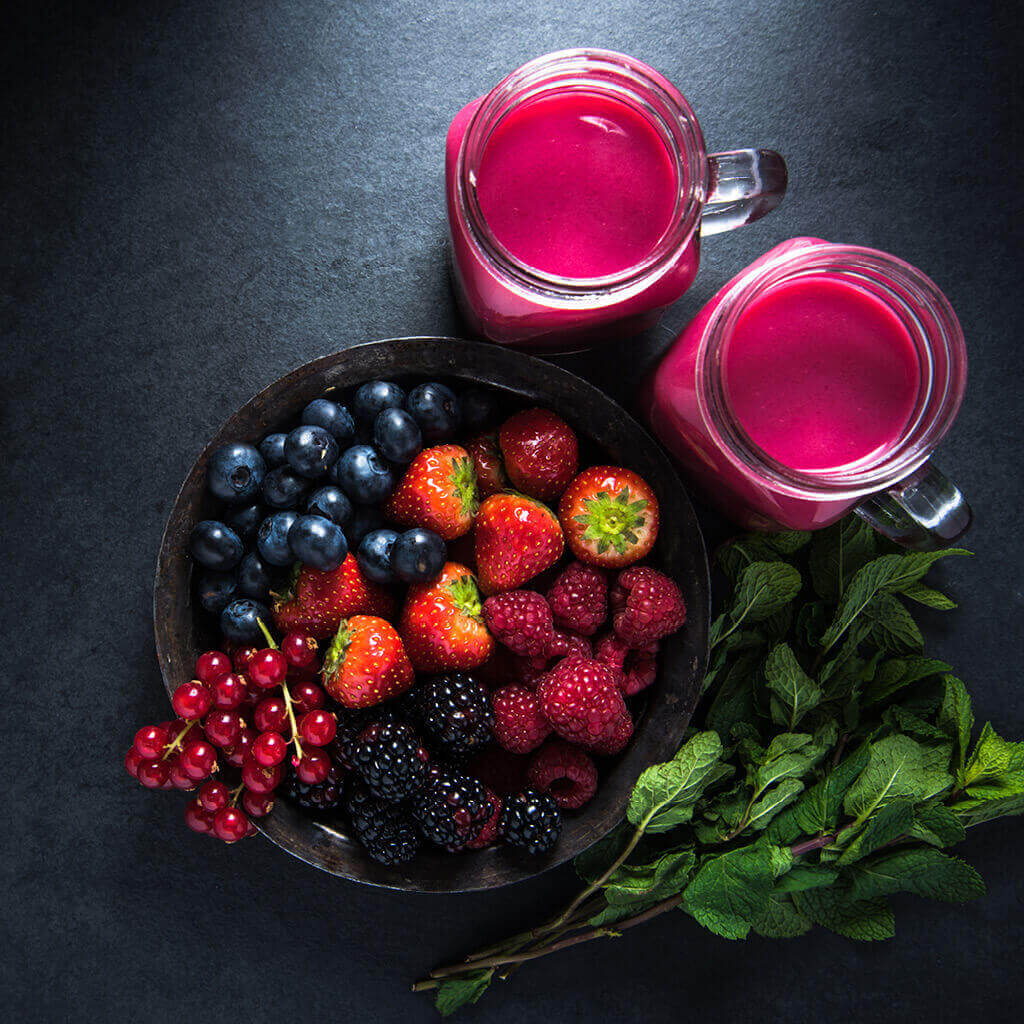Red Raspberry Leaf Tea for Morning Sickness

The fantasy of enjoying pregnancy as a serene madonna is quickly crushed by sudden bouts of morning sickness. Meals are interrupted by a mad dash for the bathroom, we find ourselves nervously eyeing every wastebasket at work “just in case”. This is more than just an annoyance, this is a problem. Enjoying lunch with friends or an evening out with your mate before diapering duties begin are quickly spoiled when the scent of onions, garlic, alcohol, even coffee make it impossible to eat.
Morning sickness isn’t confined to mornings alone. It can strike at anytime of day, sometimes all day long. But don’t despair. There is some good news in this messy little problem. Morning sickness appears to presage a healthy pregnancy. Women who experience nausea are less likely to miscarry and more likely to have uncomplicated deliveries than those who never feel sick. And there may be relief in a simple cup of red raspberry leaf tea.
So lets talk about what morning sickness is, why you have it and how you can leave the house without an airline barf bag tucked into your purse.
What is Morning Sickness

Morning sickness is defined as nausea and vomiting during pregnancy. We call it “morning sickness” but it can happen at any time of the day or even all day long. It usually goes away by the end of the first trimester as the body settles into a less disruptive cycle of hormonal fluctuation. Though no one is absolutely certain as to why it happens there are 3 things generally associated with the occurrence.
1) Reduced blood sugar may be the cause of the nausea.
2) It may be a reaction to the increased hormonal levels associated with early stages of pregnancy.
3) It is usually triggered by smells that are suddenly and surprisingly offensive.
Low Blood Sugar
Pregnancy can cause a change in the way your body processes sugar. Many women experience low blood sugar as sweating, a light-headedness, blurred vision, shakiness or dizziness. Some women experience a racing heart, hunger or nausea. Low blood sugar requires a slight change in the way we eat. Having light meals more frequently can help prevent this.
The body of a pregnant woman also produces more blood in order to support the growth of the baby. This can lower blood sugar levels and blood pressure contributing to tiredness and fatigue.
These are normal occurrences in pregnancy. However, vomiting too much and too often can cause dehydration. This, in turn, forces the liver to overproduce “ketones“ a chemical product that usually supplies energy to the body. An increase in the level of ketones can be harmful to the fetus. Severe nausea and/or pain associated with vomiting may require medical attention. Likewise, a fever or vomiting past the 14th week of pregnancy should be discussed with an OB/GYN
By now most of us are familiar with hyperemesis gravidarum. This condition can cause dehydration and threatens the health of both baby and mother who is unable to eat or drink without vomiting. Kate Middleton has suffered from hyperemesis gravidarum during pregnancy. Duchess Catherine has been required to stay in a hospital to receive nutrition and fluids through IV.
These are very rare complications, however, and only 10% of women report symptoms morning sickness beyond the 20th week of pregnancy.
Pregnancy creates an upheaval in normal hormonal balance
During early pregnancy, there is a sharp rise in the levels of
estrogen and progesterone and the hormone associated with pregnancy hormone, human chorionic gonadotropin (HCG).
Progesterone relaxes muscles and blood vessels thus lowering blood pressure which can cause not only dizziness but also gas, and constipation heartburn, reflux, nausea and vomiting.
Increased estrogen levels are responsible for that pregnancy “glow” but it can also cause increased appetite, spider veins and nausea.
HCG is even more suspect as the culprit behind morning sickness since it is at the highest levels during the first trimester and tapers off as the pregnancy continues. HCG is produced by the tissue that eventually becomes the placenta and is the chemical detected by the home pregnancy tests. High concentrations of beta HCG in urine indicate pregnancy. Women with the highest levels of HCG often have more nausea and vomiting during pregnancy than those with lower levels.
Pregnant women are often concerned that the physical action of throwing up will harm the baby or cause miscarriage. All experts agree that this is an unwarranted fear since the muscles involved are not at all associated with the safety of the womb.
Why does the smell of an onion bagel make you want to barf?

Pregnancy itself may cause an increased sensitivity to odors turning normally pleasant aromas or those that we never really notice into rancid, vomit inducing triggers. In essence, it is just chemistry. Some studies have alleged that morning sickness is a reaction to potentially harmful chemicals forcing pregnant women to avoid foods that might, in some way, interfere with a pregnancy. The early stages of growing a child involve a complex negotiation of tissues between the body of a gestating woman and the fetus she is growing.
While these two work out the distribution and type of nutrition necessary to keep them both healthy there is a biological response to foods that will help and those that will interfere with the process. While you might be able to eat a tasty plate of cabbage your body might decide it is an unnecessary burden to the digestive system and cause you to throw it up before it leaves your stomach.
Some vegetables, alcohol and caffeinated drinks of any kind are often rejected in early pregnancy. Women quickly learn which foods will stay down and which are likely to come back up. And these will change over time as the internal business of building a baby progresses.
In several studies it has been shown that women who have morning sickness are less likely to miscarry than women who do not. There is, in fact, a significant difference. It is also interesting to note that women who vomit as a result of morning sickness have fewer miscarriages than those who feel nausea but do not actually throw up.
The most surprising information suggests that the strongest reactions are associated with meat, fish, poultry and eggs. These are all staples within our culture, likely to be a part of most diets with which we are familiar. However, in traditional cultures in other parts of the world where few if any animal products are consumed, there is very little or no morning sickness.
A plant based diet, usually centered on corn does not trigger nausea and vomiting. It is possible that food requiring the modern convenience of refrigeration may be considered by the human body to be potentially dangerous as it once could have contained microbial parasites, toxins and pathogens without proper storage.
A pregnant woman’s immune system is naturally suppressed in order not to reject the developing fetus and so they both are particularly susceptible to illness due to foodborne microorganisms and toxins. This would account for nature’s protective response to any foods that could, under any circumstance, threaten the health and safety of mother and baby.
If animal products, dairy or eggs make you feel sick during early pregnancy it may change later on as the fetus matures and body becomes less reactive to the variety of nutrition and odors.
Red Raspberry Leaf Tea

Raspberry leaf (Rubus idaeus, R. strigosus, R. parviflorus) has been used for centuries in Europe, China, and the Americas since the late 1500s.
This preparation may, in fact, be one of the best morning sickness remedies. While not an actual tea, the leaves of the plant are steeped in hot water to create an “infusion” which does not taste like raspberries since only the leaves are used. This herbal tea tastes very similar to black tea but contains no caffeine but plenty of vitamins and some very useful minerals.
Folklore deems it useful for all the discomforts of pregnancy including morning sickness, leg cramps and sleep issues. Most “pregnancy” teas contain red raspberry leaf.
Just as no one is certain as to what causes morning sickness there is no certainty as to why Red Raspberry Leaf Tea can relieve it. Suffice it to say there are plenty of good reasons to give it a try. It may be that a warm drink that supplies a soothing dose of muscle relaxing magnesium eases the stomach.
A deficiency in manganese can cause nausea and vomiting so it is possible that the body finds itself occasionally short on this mineral during the early stages of pregnancy. Red Raspberry Leaf Tea delivers a fair dose of manganese which may account for the relief. The vitamins in this preparation are an important additional benefit which may or may not help with morning sickness but a natural source of vitamins is always superior to a synthetic form.
Vitamins and Minerals
Vitamins A, B1, B2, and B3 as well as vitamins C and E
An ounce of raspberry leaf may contain as much as:
- 408 mg calcium
- 446 mg potassium
- 106 mg magnesium
- 3.3 mg iron
- 4 mg manganese
- niacin
- selenium
The high amounts of magnesium and potassium in addition to the iron and B vitamins make this useful for quelling nausea, easing leg cramps, and improving sleep during pregnancy.
A Natural Anti-Inflammatory
The chemical in raspberries that provide that vibrant red color is well known as an anti-inflammatory. Anthocyanin can relieve pain and reduce inflammation in joints making it useful in cases of gout and arthritis. During pregnancy red raspberry leaf tea could provide similar relief to overtaxed joints and ease irritated muscles without the complications of over the counter medications.
An Antioxidant
The fruit of the red raspberry has excellent antioxidant properties, useful in protecting membranes from damaging free radicals. In a study an extract of the red raspberry leaf proved stronger than rosehip, thyme, mint leaf, nettle flower, chamomile flower and linden. All are well-known powerhouse antioxidants but red raspberry leaf beat them all with ample amounts of ellagic acid, quercitin and anthrocyanins. Antioxidants provide protection form bacterial and fungal infections. This is big plus during pregnancy.
Why Herbal Tea?
Often created with berries, roots, or flowers, seeds and leaves. A wide variety of plants are used to make herbal preparations which are often called “tea” but are technically, “infusions”.
True herbal teas are not made with leaves from an actual tea plant and do not contain caffeine. Many herbal teas have traditional uses and many are the basis of holistic and natural medicines. Some infusions are simply fruit flavored waters and, while they are tasty and nutritious they are not medicinal preparations.
Many holistic practitioners and midwives recommend Red Raspberry Leaf Tea in order to prevent complications in pregnancy and labor such as preeclampsia, preterm labor, prolonged labor and postpartum hemorrhage. Medical studies show that there are also fewer interventions necessary during delivery such as rupturing the membrane and cesarean delivery.
Non-Herbal Teas
Although black, white and green teas can have great health benefits, during pregnancy it is generally thought to be wise to cut out caffeine since it crosses the placenta and the baby cannot metabolize it. A cup of non-herbal tea can contain 40-50 milligrams of caffeine. Even a decaffeinated non-herbal tea has a small amount, .4 milligrams of caffeine.
Red Raspberry Leaf Tea has many uses. It’s a warm comforting weapon against the travails of morning sickness to be sure but this is not a tea to cast aside once the morning sickness has passed. Red Raspberry Leaf Tea can be useful for many things throughout your life. Potassium deficiency has been closely associated with high blood pressure and an increased risk of heart disease. Many holistic practitioners recommend it for gingivitis and muscle cramps, it is believed to reduce vaginal yeast infections and irritable bowel disease as well.







